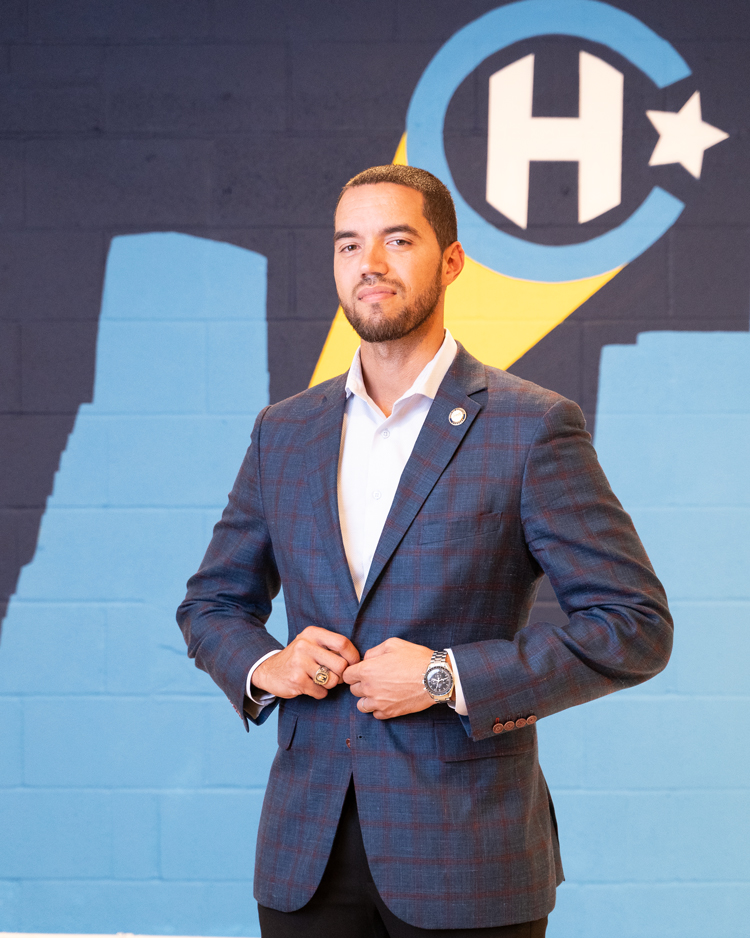An Ideal Ally
Chris Hollins hopes to advocate for marginalized communities as Houston City Controller.

Chris Hollins is probably a name you’ve heard about in the last three years, but he has been invested in marginalized communities for his entire life. Being reared in public service by his parents (who fostered more than 20 children), he was impacted by their unselfish generosity from a very early age. It was a mindset that animates his career as a rising Houston politician: Regular folks trying to help their neighbors.
Now in his mid-30s, Hollins rose to national prominence in 2020 as the Harris County Clerk who spearheaded innovative approaches to increasing voter engagement during the pandemic. Initiatives like 24-hour drive-through voting locations were successful in boosting early-voter turnout citywide. He is currently a candidate for City Controller in Houston’s upcoming municipal elections. Hollins is a graduate of Morehouse College, Yale Law School, and Harvard Business School.
Since I met Chris two years ago, he has been a consistent example of what it means to be an LGBTQ ally. Even with all of his political and professional acclaim, he still has a progressive heart for people at the margins. You’ll find him connecting people to resources, creating economic opportunity, and advocating on behalf of the LGBTQIA+ community in a way that is unheard of among heterosexual Black males. When he shows up to our spaces, he is willing to listen and learn from the communities he serves.
Oftentimes, allyship is hard to define because it is so nuanced, but Chris defines it as “a friend that has your back and is willing to go to battle on your behalf, even if they don’t share your background.” It is that commitment that shines brightly in his work as he continues to move people forward.
Allyship is necessary in the current political and social climate as anti-LGBTQ legislation injects stigma, fear, and even violence into everyday conversations. With estimates of the queer community comprising just over 7 percent of the American population, it will be nearly impossible to move the needle toward an equitable future without the help of politicians like Hollins joining our fight for justice and equal rights.
“For anybody considered ‘other,’ the government is trying to limit equal opportunity and attack them,” Hollins notes. “I hope for a future where everyone knows that being themselves won’t limit the scope of what they are capable of achieving.”
This helps to put allyship into a perspective tangible to everyone. In whatever ways you hold privilege or power, you can use that power to be a better ally to marginalized people—starting with envisioning a better outcome than the world currently envisions for them.
Allyship is important because it focuses us on the people who need the most help and increases their opportunities for success. Further, that type of focus allows us to see that allyship is not just for one community; all marginalized people need to come together in solidarity and support of a more equitable society. From whatever position you hold, you can find ways to pursue allyship in meaningful and impactful ways.
“When I look back on my life, I want to focus on the difference that allyship made in people’s lives.” —Chris Hollins
“When I look back on my life, I want to focus on the difference that allyship made in people’s lives as I see neighborhoods rebuilt, better access to transportation, and revitalized parks for all Houstonians. I also want to lay a foundation where small-business owners with diverse backgrounds can grow, and I want to get people set up for success with bank accounts, better credit, and necessities like internet access.”
The core of allyship is about the uplifting of voices that are silenced. bell hooks, an acclaimed writer and thought leader who passed away in 2021, introduced a framework widely known to movement work called the “margin-to-center theory.” Though the theory was initially focused on feminism, it applies to all marginalized identities including queer people and people of transgender experience. It asserts that by centering those at the margins when considering solutions, you can create more expansive solutions that can impact more people. Allies should strive to use this concept in our varying roles as we promote solutions to the problems we’re all experiencing.
Chris Hollins has found the balance in centering this approach to allyship. “I don’t want anyone to have to be lucky just to get a fair shot. Everyone should experience a Houston that is safe and that appreciates us as we grow, thrive, and excel.”
Allyship is about more than saying nice things about those who are at the margins. Ideally, it’s a commitment that can propel them to greater visibility, opportunity, and sustainability. That commitment takes courage, but the payoff is a better society, stronger communities, and a brighter future for all. “We’re in a critical time,” Hollins concludes. “Our job as neighbors is to connect people to real solutions.”
I can’t think of anything more ideal than that.
Follow Hollins’ campaign for City Controller at chrishollins.com.











FB Comments